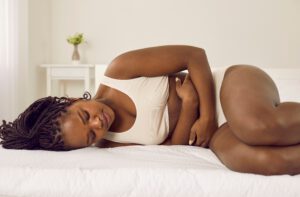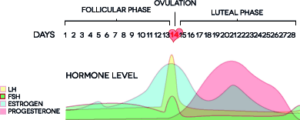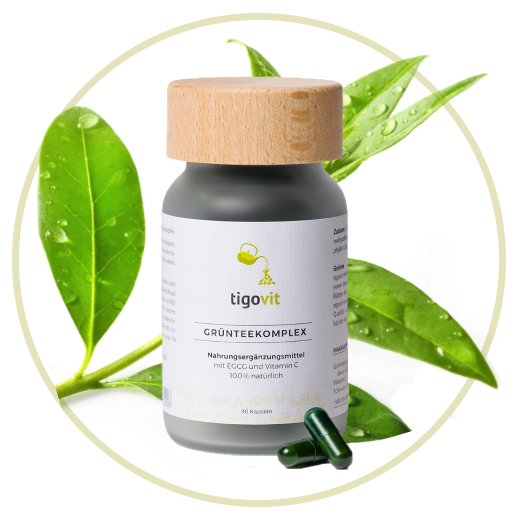Premenstrual syndrome (PMS) describes a variety of physical and psychological symptoms that can occur in the second half of the female cycle - especially in the days leading up to the period. Many women of childbearing age are affected, although the severity can vary greatly. While some women only experience mild symptoms, others are considerably restricted in their everyday lives.
What is PMS?
PMS is triggered by hormonal fluctuations in the luteal phase - the time after ovulation until the period. The main players are the Hormones Progesterone and Oestrogenwhose balance is particularly important during this phase. A progesterone deficiency or a relative excess of oestrogen can intensify the typical PMS symptoms such as mood swings, sleep problems, irritability or physical discomfort.
How do I recognise PMS?
The diagnosis of PMS is challenging, as the symptoms can also indicate other illnesses, such as thyroid problems or chronic stress. According to the American College of Obstetricians and Gynecologists (ACOG) PMS is present if the following criteria are met:
- The symptoms regularly occur in the last five days before menstruation.
- They improve within the first four days after the start of your period.
- They have a negative impact on the everyday lives of those affected.
A precise clarification by a specialist is essential to rule out other causes.
Where can I get advice?
If you suspect you are suffering from PMS, there are various places you can turn to for help:
- Gynaecologists:
They are the first port of call for investigating the hormonal causes of your symptoms and discussing specific treatment options. - Endocrinologists:
These specialists can carry out in-depth hormonal tests to detect any imbalances. - Naturopaths and naturopaths:
Some women prefer alternative approaches, such as the use of herbal extracts and phytotherapy methods and a holistic approach to their symptoms. - Psychotherapists and psychotherapists:
In the case of severe psychological symptoms or PMDS (premenstrual dysphoric disorder), an accompanying therapy can be helpful. - Online platforms: Take advantage of the exchange with like-minded people and experts in Online forums like the Tea&Science women's exchange forum with Tanja Hohenester and Andrea Mohr.
PMS: The interplay of hormones and cycle phases
It is also important that you get to know yourself better and nourish your body. Here is some background knowledge: The female cycle is divided into four phases: Menstrual, Follicular, Ovulatory and Luteal. Each phase is characterised by a specific hormonal balance that influences not only fertility but also general well-being.
1st menstrual phase (day 1-5)
Hormone levels are low, which triggers the breakdown of the uterine lining. Many women feel drained of energy during this phase.
2nd follicular phase (day 6-14)
The hormone Oestrogen increases and promotes the rebuilding of the uterine lining. Women often feel energised and powerful. You have the strength to tackle your projects.
3rd ovulation phase (day 13-15)
A peak oestrogen level triggers ovulation. At the same time Luteinising hormone (LH) is released. Women often report an increased libido and ability to concentrate during this phase.
4th luteal phase (day 16-28)
The corpus luteum produces progesterone, which prepares the body for a possible pregnancy. If the progesterone level drops too low, this can cause the typical Cause PMS symptoms: from breast tenderness to emotional complaints such as irritability or anxiety.
Our cycle phases and which hormones determine them.
Cycle-orientated nutrition: how it can help
A cycle-orientated diet takes into account the hormonal needs of the individual cycle phases and can help to reduce PMS symptoms.
Follicular phase (day 6-14): Build-up and energy
- Focus on protein and complex carbohydrates (e.g. quinoa, oatmeal) for energy and build-up.
- Foods with a high oestrogen content such as soya, linseed and broccoli support this phase.
Ovulation phase (day 13-15): Inhibition of inflammation
- Antioxidant-rich foods such as berries, spinach and green tea promote the health of the egg cell.
- Light, fresh meals help with digestion and provide energy.
Luteal phase (day 16-28): Relaxation and hormone balance
- Progesterone-friendly foods such as pumpkin seeds, sunflower seeds and sweet potatoes help to stabilise your mood.
- Magnesium-rich snacks such as dark chocolate (with a high cocoa content) relieve muscle cramps and irritability.
- Make sure you drink enough fluids with teas made from tried and tested plants such as lady's mantle.
Menstrual phase (day 1-5): Regeneration
- Iron-rich foods such as beetroot, spinach and lentils compensate for blood loss.
- Eat cooked root vegetables such as carrots, potatoes, sweet potatoes and parsnips or drink warm cocoa (without sugar).
- Lady's mantle, ginger or camomile tea have a calming and soothing effect.
Tips for suspected PMS
- Keep a cycle diary: Note symptoms, diet and stress levels to recognise patterns.
- Movement: Regular, moderate exercise such as yoga or walks can reduce stress.
- Herbal helpers: Get advice on which medicinal plants can support you individually through your cycle
- Relaxation: Soothing massages, breathing exercises, yin yoga, meditation or a warm bath promote well-being.
Conclusion: personalised advice and targeted measures
PMS is a complex issue that requires individualised attention. Collaboration with experts - whether in conventional medicine or naturopathy - is the key to an accurate diagnosis and effective treatment.
Combined with a cycle-orientated diet, a balanced lifestyle and stress management, many women can sustainably alleviate their symptoms and find a greater sense of well-being. Each cycle offers the opportunity to get to know your own body better and to live in harmony with hormonal changes.






